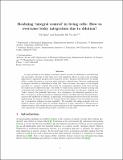Realizing ‘integral control’ in living cells: how to overcome leaky integration due to dilution?
Author(s)
Qian, Yili; Del Vecchio, Domitilla
DownloadJRSIIntegral.pdf (589.6Kb)
OPEN_ACCESS_POLICY
Open Access Policy
Creative Commons Attribution-Noncommercial-Share Alike
Terms of use
Metadata
Show full item recordAbstract
A major problem in the design of synthetic genetic circuits is robustness to perturbations and uncertainty. Because of this, there have been significant efforts in recent years in finding approaches to implement integral control in genetic circuits. Integral controllers have the unique ability to make the output of a process adapt perfectly to disturbances. However, implementing an integral controller is challenging in living cells. This is because a key aspect of any integral controller is a ‘memory’ element that stores the accumulation (integral) of the error between the output and its desired set-point. The ability to realize such a memory element in living cells is fundamentally challenged by the fact that all biomolecules dilute as cells grow, resulting in a ‘leaky’ memory that gradually fades away. As a consequence, the adaptation property is lost. Here, we propose a general principle for designing integral controllers such that the performance is practically unaffected by dilution. In particular, we mathematically prove that if the reactions implementing the integral controller are all much faster than dilution, then the adaptation error due to integration leakiness becomes negligible. We exemplify this design principle with two synthetic genetic circuits aimed at reaching adaptation of gene expression to fluctuations in cellular resources. Our results provide concrete guidance on the biomolecular processes that are most appropriate for implementing integral controllers in living cells.
Date issued
2018-02Department
Massachusetts Institute of Technology. Department of Mechanical Engineering; Massachusetts Institute of Technology. Synthetic Biology CenterJournal
Journal of The Royal Society Interface
Publisher
Royal Society Publishing
Citation
Qian, Yili, and Domitilla Del Vecchio. “Realizing ‘integral Control’ in Living Cells: How to Overcome Leaky Integration Due to Dilution?” Journal of The Royal Society Interface 15, no. 139 (February 2018): 20170902.
Version: Author's final manuscript
ISSN
1742-5689
1742-5662